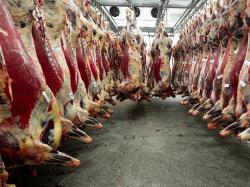Tyson Takes Lead With Zilmax Ban, Higher Beef Prices May Follow
August 9, 2013 | 1 min to read

When top U.S. meat packer Tyson Foods Inc abruptly announced it would stop buying cattle fed with a widely used drug that can add more than 30 pounds to the average steer, the implications for markets were clear: less meat, higher prices.
Tyson, which buys about one in four of all U.S. cattle for slaughter, says it will stop purchasing livestock with the growth additive Zilmax in order to protect the animal's welfare, a sign of the growing sway of animal rights activists. Some cattle appear to have had trouble walking with the added weight.
While the move could put a dent in Tyson's margins by limiting its choice to higher-cost cattle, some analysts also saw a potential commercial benefit — exports. Big meat importers including Russia and China moved recently to ban a similar growth-enhancing drug, ractopamine, used in pigs.
But either way, the question now is whether others will follow. So far Tyson, which on average processes 132,000 head of cattle per week, stands alone in boycotting a drug used in half or more of the U.S. herd, according to industry sources.
To read the rest of the story, please go to: Reuters
